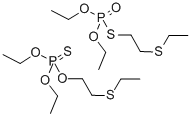DEMETON
- CAS No.
- 8065-48-3
- Chemical Name:
- DEMETON
- Synonyms
- 1059;SYSTOX;ulv;demox;septox;dematon;DEMETON;bay10756;systemox;ent17,295
- CBNumber:
- CB7126703
- Molecular Formula:
- C8H19O3PS2.C8H19O3PS2
- Molecular Weight:
- 516.68
- MDL Number:
- MFCD00466988
- MOL File:
- 8065-48-3.mol
| Boiling point | bp2 134° |
|---|---|
| Density | 1.1183 g/cm3 (20℃) |
| refractive index | 1.4875 (589.3 nm 20℃) |
| solubility | Chloroform (Sparingly), Ethyl Acetate (Slightly), Methanol (Slightly) |
| form | Pale yellow to light brown, oily liquid |
| Exposure limits |
TLV-TWA: 0.1 mg/m3 (skin) (ACGIH) PEL-TWA: 0.1 mg/m3 (skin) (OSHA) IDLH: 20 mg/m3 (WHO). |
| EWG's Food Scores | 4-5 |
| FDA UNII | F74QXK6K3Q |
| EPA Substance Registry System | Demeton (8065-48-3) |
SAFETY
Risk and Safety Statements
| Symbol(GHS) |   GHS06,GHS09 |
|---|---|
| Signal word | Danger |
| Hazard statements | H300+H310-H400 |
| Precautionary statements | P264-P273-P280-P301+P310-P302+P350-P310 |
| Hazard Codes | T+,N |
| Risk Statements | 27/28-50 |
| Safety Statements | 28-36/37-45-61 |
| RIDADR | 3018 |
| OEB | D |
| OEL | TWA: 0.1 mg/m3 [skin] |
| RTECS | TF3150000 |
| HazardClass | 6.1(a) |
| PackingGroup | I |
| HS Code | 29309090 |
| Toxicity | LD50 in female, male rats (mg/kg): 2.5, 6.2 orally; 8.2, 14 dermally (Gaines) |
| IDLA | 10 mg/m3 |
DEMETON Chemical Properties,Uses,Production
Chemical Properties
Demeton is a light brown liquid with an odor of sulfur compounds; freezing/melting point ≤‐13 C
Uses
Acaricide; insecticide
Uses
Insecticide.
General Description
Oily liquid with an amber color and an odor of sulfur. Used as an agricultural insecticide.
Reactivity Profile
DEMETON may release sulfur oxides and phosphoric acid. Solvent carrier vapors may travel on ground to ignition source. Avoid strong oxidizers. Avoid mixtures with water or polar solvents, in which sulfur is lost to oxygen, air and light, which cause hydrolysis, alkaline mixtures and oxidizing agents. [EPA, 1998].
Health Hazard
DEMETON is a cholinesterase inhibitor. It is readily absorbed through the skinand is extremely toxic. Probable human lethal oral dose is 5-50 mg/kg or 7 drops to 1 teaspoonful for 150 lb. person. Acute dose is believed to be 12 to 20 mg by oral route.
Health Hazard
One of the extremely toxic organophosphorus pesticides; cholinesterase inhibitor;exhibits acute, delayed, and chronic effects;toxic symptoms include headache, dizziness, muscle spasms, pinpoint pupils, blurredvision, weakness, abdominal pain, vomiting,nausea, diarrhea, and seizure; high exposuremay cause coma and death; other symptomsare chest pain, low or high blood pressure,shortness of breath, psychosis, respiratorydepression, and respiratory paralysis; readily absorbed through skin; effects may bedelayed by several hours; ingestion can causeimmediate seizure or loss of consciousness;probable oral lethal dose within the range0.4–2 g for adult humans.
LD50 oral (rat): 1.7 mg/kg
LD50 skin (rat): 8–14 mg/kg.
Fire Hazard
May release sulfur oxides and phosphoric acid. Solvent carrier vapors may travel on ground to ignition source. Avoid strong oxidizers. Avoid mixtures with water or polar solvents, in which sulfur is lost to oxygen, air and light, which cause hydrolysis, alkaline mixtures and oxidizing agents.
Potential Exposure
A potential danger to those involved in the manufacture, formulation, and application of this systemic insecticide and acaricide.
Shipping
UN3278 Organophosphorus compound, liquid, toxic, n.o.s., Hazard Class: 6.1; Labels: 6.1-Poisonous materials, Hazard Technical Name Required, Potential Inhalation Hazard (Special Provision 5). UN3017 Organophosphorus pesticides, liquid, toxic, flammable, flash point not , 23 C, Hazard class: 6.1; Labels: 6.1- Poisonous materials, 3-Flammable liquid. UN2810 Toxic liquids, organic, n.o.s., Hazard Class: 6.1; Labels: 6.1- Poisonous materials, Technical Name Required.
Incompatibilities
May form explosive mixture with air. Strong oxidizers, strong bases, soluble mercury, other pesticides, and water.
Waste Disposal
The thiono-and thiolo-isomers of this mixture are 50% hydrolyzed in 75 minutes and 0.85 min- ute, respectively @ 20℃ and pH 13. At pH 9 and 70 ℃ , the half-life of Demeton is 1.25 hour, but an pH 1-5 it is over 11 hours. Sand and rushed limestone may be added together with a flammable solvent; the resultant mixture may be burned in a furnace with afterburner and alkaline scrubber .In accordance with 40CFR165, follow recommendations for the disposal of pesticides and pesticide containers. Must be dis- posed properly by following package label directions or by contacting your local or federal environmental control agency, or by contacting your regional EPA office.
DEMETON Preparation Products And Raw materials
8065-48-3(DEMETON)Related Search:
1of4





